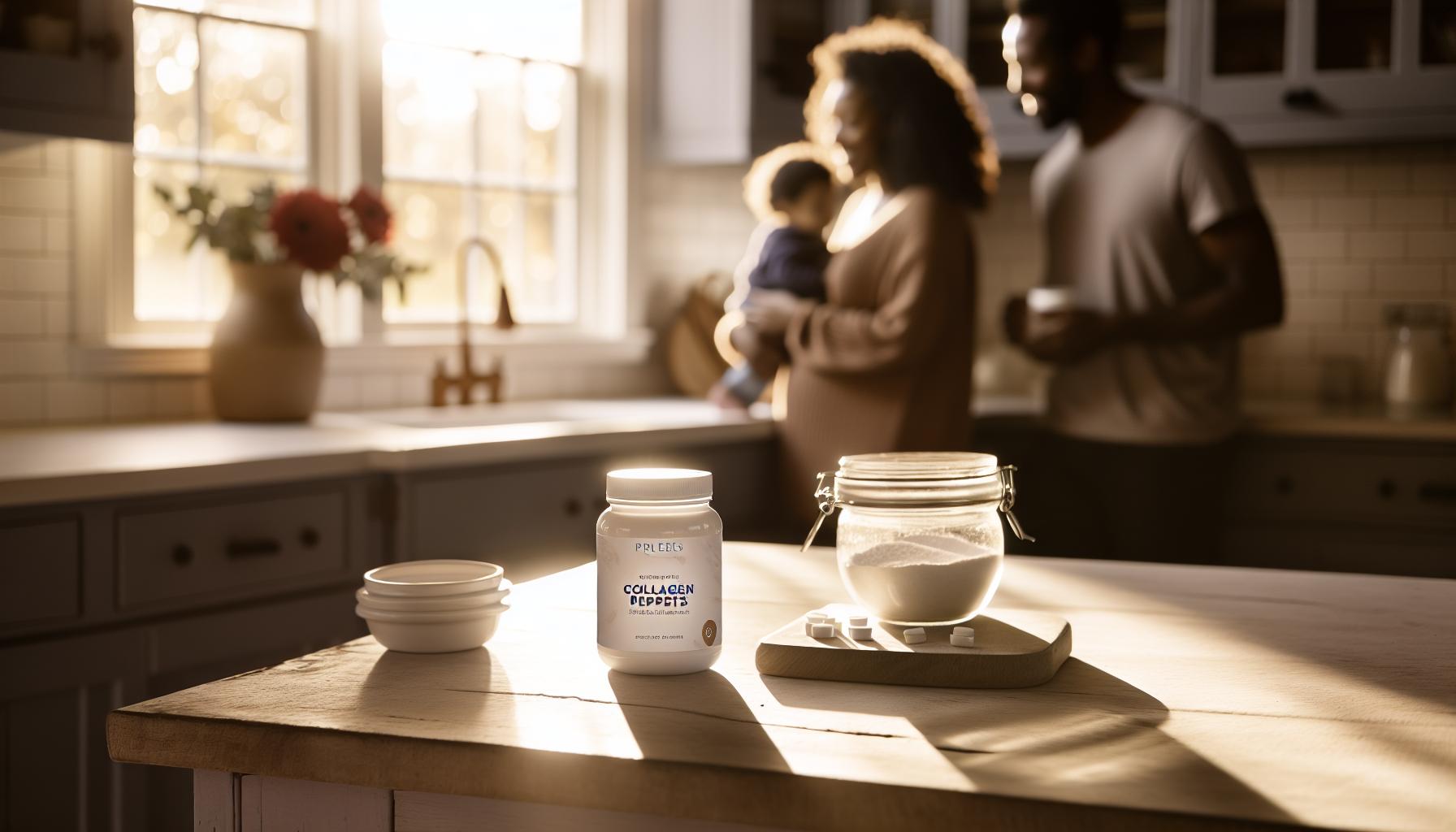Navigating nutrition while breastfeeding can feel overwhelming, especially with so many supplements claiming to promote health. One such contender is collagen peptides, known for their potential benefits like improved skin elasticity and joint support. This article explores the advantages of incorporating collagen while nursing and offers essential safety tips for new mothers.
Understanding Collagen Peptides: What They Are and Why They Matter
What Are Collagen Peptides?
Collagen peptides are small fragments of collagen, a crucial protein that forms the building blocks of various tissues in our bodies, including skin, bones, cartilage, and muscles. They are derived from collagen through a process called hydrolysis, which breaks down the protein into shorter chains of amino acids.This process enhances their bioavailability, meaning they are easier for the body to absorb and utilize. while collagen is a natural component of our bodies, the production of collagen decreases with age, leading to various signs of aging and joint issues.
Importance in Health and Nutrition
Integrating collagen peptides into your diet can have numerous health benefits, notably during notable life phases like breastfeeding. They are known to support skin elasticity and hydration, which can be beneficial for new mothers experiencing changes in their skin due to hormonal fluctuations. Additionally, collagen peptides play a role in joint health by promoting the synthesis of cartilage, which is particularly crucial for active parents who may experience joint discomfort. furthermore, they support bone health by stimulating osteoblast activity, contributing to overall strength and resilience.
Why They Matter for Breastfeeding Mothers
For breastfeeding mothers, maintaining optimal health is essential, not just for their well-being but also for the health of their baby. Incorporating collagen peptides can help alleviate stress on joints and muscles, which is vital after the physical demands of pregnancy and childbirth. They also provide an excellent source of protein, which is essential for energy and recovery during this demanding period.
- Improved Skin Health: Collagen peptides may help in maintaining skin elasticity, crucial for new mothers.
- Joint Support: They aid in reducing joint pain and improving mobility,essential for managing daily activities with a newborn.
- Bone Strength: Collagen peptides can contribute to stronger bones,supporting overall physical activity.
Incorporating collagen peptides into your daily routine can be done through dietary sources or supplements, making it a flexible option for enhancing maternal nutrition. Whether in smoothies, soups, or bone broth, there are countless ways to include these beneficial peptides in your diet, helping you feel your best during the breastfeeding journey.
| Benefit | How It Helps |
|---|---|
| skin Elasticity | Enhances hydration and reduces signs of aging. |
| Joint Health | Reduces discomfort and improves mobility. |
| Bone Strength | Supports the structural integrity of bones. |
understanding collagen peptides and their benefits paves the way for breastfeeding mothers to make informed dietary choices that not only boost their health but also support their new role as caregivers.
The Benefits of Collagen Peptides During Breastfeeding
promoting Health and Recovery
Incorporating collagen peptides into your diet during breastfeeding can yield considerable health benefits for both mother and child. As a biological building block, collagen supports tissue repair and regeneration, which is particularly important during this postpartum phase when the body is recovering from childbirth. The peptides can aid in the healing of abdominal muscles and skin, reducing the appearance of stretch marks and promoting a better recovery overall.
Boosting Nutritional Intake
Breastfeeding mothers have increased nutritional needs, and collagen peptides can play a complementary role in meeting these demands. These peptides are rich in essential amino acids, particularly glycine and proline, which contribute to the synthesis of other proteins necesary for milk production.Adding collagen to your diet can help ensure you are obtaining enough protein to support lactation while also enhancing your bone health, which is crucial as estrogen levels drop postpartum.
- Enhanced skin Elasticity: Collagen peptides can improve skin hydration and elasticity, which may help combat the changes associated with breastfeeding.
- Joint Health Support: The physical strains of motherhood can led to joint discomfort; collagen peptides help maintain adaptability and reduce pain.
- Gut Health Betterment: Collagen supports the integrity of the gut lining, possibly aiding digestion during a time when dietary choices can shift.
Safety and Considerations
While collagen peptides are generally deemed safe during breastfeeding, it’s essential to opt for high-quality sources to avoid any additives or contaminants. Choosing hydrolyzed collagen can maximize absorption and minimize potential digestive issues. It’s advisable for breastfeeding mothers to consult with a healthcare provider before introducing any new supplement into their routine, ensuring that the chosen collagen peptides align with their dietary needs and health objectives.by integrating collagen peptides into your nutrition plan while breastfeeding, you can foster not only your well-being but also potentially support the health of your baby through improved milk quality.
Safety First: Guidelines for Consuming Collagen While Nursing
Maternal nutrition plays a crucial role in both the health of the nursing mother and the development of her baby. One supplement gaining attention for its potential benefits is collagen peptides. While widely regarded for their supportive role in skin, hair, and joint health, many new mothers may wonder about the safety and efficacy of collagen peptides while breastfeeding.Understanding how to incorporate this supplement into your diet can provide peace of mind and enhance your well-being during this transformative time.
Understanding the Benefits
Integrating collagen peptides into a nursing diet may boost not only the mother’s vitality but also contribute to the overall quality of her breast milk. Collagen is known to support:
- Skin Elasticity: Helps counteract the postpartum effects on skin.
- Joint Health: Provides comfort after the physical strains of pregnancy and childbirth.
- Hair and Nail Growth: Promotes postpartum hair recovery and stronger nails.
However, while these benefits are appealing, safe consumption is paramount. It’s essential to prioritize both the mother’s and the baby’s health when considering any dietary adjustments.
Safety Guidelines for Collagen Intake
To ensure a beneficial experience while consuming collagen peptides during breastfeeding, consider the following safety tips:
- Consult Your Healthcare Provider: Before starting any new supplement, it’s crucial to discuss it with your doctor or a registered dietitian, especially during nursing.
- Choose High-Quality Products: Always opt for collagen supplements from reputable brands that undergo rigorous testing for purity and safety.
- Monitor for Allergies: Even though collagen is generally considered safe, remain vigilant for any allergic reactions or gastrointestinal discomfort in both yourself and your baby.
- start with Low Doses: If you decide to incorporate collagen peptides, begin with a smaller amount and gradually increase as needed, observing any changes in your body or milk supply.
Nutrition Balance is key
When consuming collagen peptides while breastfeeding, remember that a balanced diet remains essential. Pairing collagen with nutrient-dense foods can magnify its benefits.For example, combining collagen with vitamin C-rich foods like oranges or bell peppers can enhance collagen synthesis.
| Vitamin C-Rich foods | Serving Suggestions |
|---|---|
| oranges | Freshly squeezed juice or as a topping in yogurt. |
| Bell Peppers | Chopped in salads or sautéed with other vegetables. |
| Strawberries | in smoothies or as a snack with dark chocolate. |
By considering these guidelines and leveraging the benefits of collagen peptides, nursing mothers can navigate their wellness journey with confidence. Prioritizing safety and making informed choices can drastically enhance both maternal and infant health during this special period.
How Collagen Peptides Support Your Postpartum Recovery
Understanding the Role of Collagen Peptides in postpartum Recovery
Did you know that the body undergoes significant changes during the postpartum period, and supporting these transformations is crucial for new mothers? Collagen peptides play a pivotal role in this recovery by aiding in the restoration of skin elasticity, strengthening hair and nails, and promoting overall joint and bone health. As breastfeeding becomes a vital part of nurturing your baby,integrating collagen peptides into your diet can offer numerous benefits without concerns about safety for nursing mothers.
One of the most notable effects of collagen peptides is their ability to stimulate collagen production in the body, which is essential as skin can lose firmness post-pregnancy.This boost in collagen helps in reducing the appearance of stretch marks and may contribute to faster skin healing.Additionally, mothers may experience enhanced joint support, addressing any discomfort linked to adjusting to new physical demands after childbirth.Collagen peptides may alleviate joint pain by promoting the regeneration of cartilage, which can help women regain mobility and comfort during their busy days with a newborn.
Moreover, the benefits of collagen peptides extend beyond just physical recovery. They can also positively influence mental well-being.The nutritional support provided by these peptides can improve energy levels, which is especially beneficial for those long nights with a newborn. Including collagen-rich foods or supplements in your postpartum diet not only aids in physical recovery but also supports emotional resilience during this transformative phase.
When considering collagen peptides while breastfeeding, it’s important to choose high-quality sources. Look for products that are certified and free from harmful additives to ensure you’re providing the best for both you and your baby. Incorporating collagen peptides can be as simple as adding them to smoothies, yogurt, or baked goods, making it easy to enjoy their benefits during your postpartum journey.
| Benefits of Collagen Peptides | Impact on Postpartum Recovery |
|---|---|
| Stimulates collagen production | Improves skin elasticity, reduces stretch marks |
| Enhances joint health | Supports mobility, alleviates discomfort |
| Boosts energy levels | Improves overall mental well-being |
| Strengthens hair and nails | Aids in physical appearance and confidence |
Nourishing Your Body and Baby: The Nutritional Power of Collagen
Did you know that collagen,the most abundant protein in the body,plays a crucial role not just for your own health,but also for your baby’s development? As new mothers navigate the intricate journey of breastfeeding,it’s essential to understand how collagen peptides can significantly contribute to both maternal wellness and the quality of breast milk.
the Role of Collagen in Maternal Health
Collagen is a powerhouse of essential amino acids that can improve skin elasticity, hydration, and overall physical health. When nursing, your body endures numerous changes, including hormonal shifts and the physical demands of breastfeeding. Integrating collagen peptides into your diet can support:
- Joint health: Collagen helps maintain joint integrity, which is particularly important for mothers who may experience discomfort from physical strain postpartum.
- Stronger hair and nails: The fluctuating hormones can impact hair and nail health; collagen can enhance their strength and resilience.
- Skin health: being well-hydrated is critical. Collagen can improve skin texture, hydration, and elasticity, reducing the appearance of stretch marks.
Benefits for Your Baby
Your nutritional intake directly influences the quality of your breast milk, which is vital for your baby’s growth. Collagen peptides contain amino acids like glycine and proline, known to support the development of your baby’s skin, connective tissues, and even the gut lining. Here’s how collagen can benefit your baby during breastfeeding:
| benefit | Description |
|---|---|
| Skin Development | collagen is a key ingredient in your baby’s skin formation, aiding in hydration and elasticity. |
| gut Health | Amino acids found in collagen peptides contribute to a healthy gut lining, which is critical for a developing immune system. |
| Overall Growth | Essential amino acids from collagen support overall cellular growth and tissue repair in infants. |
Incorporating Collagen Peptides into Your Diet
To reap the nutritional benefits of collagen while breastfeeding, consider these practical strategies:
- Add collagen to smoothies: Blending collagen peptides into your morning smoothie can enrich your breakfast without altering the flavor.
- Incorporate bone broth: A fantastic source of natural collagen, incorporating bone broth into soups or stews provides both flavor and nutrition.
- Try collagen supplements: Available in powder or capsule form, collagen supplements can be an easy addition to your daily wellness routine.
By prioritizing collagen-rich foods and supplements, you not only support your own health during this transformative period but also contribute to the vital nourishment your baby receives through breastfeeding. This holistic approach fosters a better breastfeeding experience, ensuring both you and your little one thrive.
Expert Insights: What Healthcare Professionals Say About Collagen and Breastfeeding
Understanding the Role of Collagen in Nursing
Did you know that collagen is one of the most abundant proteins in our body, playing a vital role in maintaining skin elasticity and joint health? many healthcare professionals emphasize its importance, especially for breastfeeding mothers who experience significant hormonal changes and physical demands during this period.Experts advise that integrating collagen peptides while breastfeeding can offer several benefits without compromising safety.
Expert Recommendations on Collagen Peptides
According to nutritionists and lactation consultants,collagen peptides can support mothers in several ways:
- Skin Health: Breastfeeding frequently enough leads to dry skin due to hormonal fluctuations. collagen supplements can improve skin hydration and elasticity.
- Joint Support: The additional weight and physical exertion of breastfeeding can strain joints. Collagen helps maintain joint integrity, potentially reducing discomfort.
- Digestive Health: It’s believed that collagen supports gut health, which can be beneficial during the postpartum period when some mothers may experience digestive issues.
Safety tips from Healthcare professionals
When considering collagen supplementation, it’s vital to heed expert advice regarding safety and dosage. Not all collagen supplements are created equal,and healthcare providers recommend the following:
- Consult a Healthcare Provider: Always discuss with a pediatrician or a registered dietitian prior to starting any new supplement.
- Opt for High-Quality Sources: Look for collagen from reputable brands that use grass-fed and pasture-raised sources, ensuring purity and safety.
- Start with a Low Dose: Begin with a smaller dose to see how your body reacts, then gradually increase as needed.
Potential Risks and Considerations
While most healthcare professionals endorse collagen peptides for breastfeeding mothers, some caution against overconsumption or products with questionable additives.It’s essential to read labels carefully and avoid supplements containing allergens or artificial ingredients. Here’s a simple comparison of common collagen sources and their features:
| Collagen Source | Benefits | Considerations |
|---|---|---|
| Hydrolyzed Collagen | Easily absorbable, promotes skin and joint health | Ensure no allergens are present |
| Fish Collagen | High in amino acids, good for skin elasticity | Potential allergies for those sensitive to seafood |
| Bovine Collagen | Supports joint health and gut integrity | Check for grass-fed sources for quality |
By understanding the expert insights and practical advice outlined by healthcare professionals, breastfeeding mothers can make informed choices about incorporating collagen peptides into their diets, ultimately benefiting both their health and their baby’s well-being.
Practical Tips for Incorporating Collagen Peptides into Your Daily Routine
Boosting your Routine with Collagen Peptides
Integrating collagen peptides into your daily regimen can be both simple and rewarding, especially for those breastfeeding. High-quality collagen provides essential amino acids that can definitely help support skin, joint, and overall health. Here are some practical tips to make collagen peptides a seamless addition to your routine:
- Choose the Right Form: Collagen peptides come in various forms,including powders,capsules,and liquid. Powders are particularly versatile; they can be easily mixed into smoothies, soups, or baked goods without altering the flavor significantly.
- Add to breakfast: Start your day by mixing a scoop of collagen peptides into your morning oatmeal, cereal, or yogurt. This can enhance your meal’s nutritional profile while helping you meet your protein needs.
- Snack Options: For a nutritious snack, blend collagen peptides into smoothies or protein shakes. This is especially beneficial if you’re on the go or need a quick energy boost, ensuring you and your baby get the right nutrients.
- Incorporate into Cooking: You can add collagen peptides to soups, stews, and sauces during cooking. This not only enriches the meal but also maintains a healthy intake without any extra effort.
Monitor your Intake
When incorporating collagen peptides into your diet while breastfeeding, it’s beneficial to monitor the dosage to find what works best for you. Although collagen is generally regarded as safe, starting with a lower dosage can help you assess how your body responds. Most experts recommend around 2.5 to 15 grams per day, depending on individual needs and health goals.
Flavorful suggestions
Keeping your meals exciting can help maintain your collagen regimen. Consider these tasty options:
| Meal Type | Suggestions |
|---|---|
| Breakfast | Protein pancakes topped with mixed berries and a scoop of collagen in the batter. |
| Lunch | collagen-infused salad dressing made with olive oil, lemon juice, and a scoop of collagen peptides. |
| Dinner | Homemade broth enriched with collagen, perfect for soups or risottos. |
By making simple adjustments and being mindful of how you incorporate collagen peptides, you can enhance both your diet and your breastfeeding experience. These practical tips can help ensure that you enjoy the benefits of collagen while embracing the joys and challenges of motherhood.
Listening to Your Body: Recognizing How Collagen Affects You While Nursing
As a nursing mother, tuning into your body becomes more crucial than ever. The changes you experience during this period aren’t just about nurturing your little one; your physical and emotional well-being directly impacts your breastfeeding journey. Among the various supplements available, collagen peptides have garnered attention for their potential benefits. Though, how do you determine if they are right for you while nursing?
Understanding Your body’s response
Listening to your body involves being attuned to both its physical sensations and emotional signals. When it comes to collagen peptides, several indicators can help you evaluate their effects:
- Skin Elasticity: Increased collagen intake may enhance skin hydration and elasticity, which is particularly relevant postpartum as your body undergoes numerous changes.
- joint Health: If you experience discomfort or stiffness,particularly after lifting your baby or prolonged nursing positions,collagen could support joint flexibility.
- Energy Levels: Fatigue is common during the nursing period. If you notice improved energy after incorporating collagen, it may be beneficial for your overall stamina.
- Digestive comfort: Collagen can aid gut health. Pay attention to your digestive wellness—any improvements could indicate a positive response to collagen peptides.
Practical Steps for Monitoring Your Experience
To accurately assess how collagen peptides are affecting you while nursing, consider the following practical strategies:
- maintain a Daily Journal: Document your daily intake of collagen peptides along with any physical changes or emotional feelings you experience. Over time, patterns may emerge that clarify their impact.
- Consult Healthcare Providers: Regular check-ins with your doctor or a lactation consultant can provide valuable insights into your body’s needs during this time.
- Adjust Dosage Gradually: To understand how collagen affects you, start with a lower dosage and gradually increase it. monitor your body’s reaction to identify any benefits or side effects.
| Benefit of Collagen | How to Monitor |
|---|---|
| Improved Skin Hydration | Note changes in skin texture and moisture levels |
| Enhanced Joint Mobility | Evaluate any reduction in joint pain or stiffness |
| Increased Energy | Track your daily energy levels and fatigue patterns |
| Better Digestive Health | Monitor any changes in digestion or gastrointestinal comfort |
By actively engaging with your body’s signals, you can discern the personal impact of collagen peptides while breastfeeding. Prioritizing this attentiveness not only enhances your health but also serves your nursing relationship more effectively.
Frequently asked questions
What are Collagen Peptides and why are they important?
Collagen peptides are small protein fragments derived from collagen, a vital component of skin, bones, and connective tissues. they offer numerous health benefits, including supporting skin elasticity and joint health, making them potentially beneficial for nursing mothers.
While breastfeeding, your body undergoes significant changes, and collagen peptides can contribute to recovery and overall well-being.They may also help in maintaining skin hydration and elasticity, which is important for many new mothers as they recover from pregnancy.
Can I take Collagen Peptides while breastfeeding?
Yes, you can take collagen peptides while breastfeeding.They are generally considered safe and can provide essential nutrients that support your body during this significant period.
It is always best to consult with your healthcare provider before starting any new supplement. They can advise you based on your specific health needs and any other supplements you may be taking.For more information, check out our article on breastfeeding nutrition.
What are the benefits of Collagen Peptides while breastfeeding?
The benefits of collagen peptides while breastfeeding include improved skin elasticity, enhanced joint health, and support for overall recovery. These benefits help nursing mothers feel more pleasant and may enhance bonding with their babies.
in addition to these health benefits, collagen peptides can also assist in preventing stretch marks and may promote better hair and nail health during breastfeeding. Some mothers find that incorporating collagen into their routine makes a noticeable difference in their recovery journey.
Are there any safety tips for taking Collagen peptides while breastfeeding?
When taking collagen peptides while breastfeeding, ensure that you choose a high-quality product. Look for brands that are third-party tested and free from additives or fillers to guarantee safety.
Additionally, start with a lower dose to see how your body reacts. Monitoring for any allergic reactions or digestive upset is vital. It’s also critically important to maintain a balanced diet rich in other nutrients to support both you and your baby’s health.
Why does collagen matter for nursing mothers?
Collagen is crucial during nursing as it helps support skin health,joint flexibility,and tissue regeneration. Since your body is healing from childbirth, collagen can aid in recovery, which is especially important when you care for a newborn.
Nursing mothers may experience fatigue and physical strain, so ensuring adequate collagen intake can definitely help maintain energy levels and overall wellness. This nutrient plays a supportive role in helping mothers feel their best during this demanding time.
Can Collagen Peptides affect my milk supply?
Collagen peptides are not known to negatively impact milk supply. they mainly provide structural proteins, which are not directly connected to milk production.
however, keeping your diet balanced with adequate nutrients is key to supporting breastfeeding. If you’re concerned about milk supply, consider other factors like hydration and overall dietary habits along with collagen supplementation.
How can I incorporate Collagen Peptides into my diet while breastfeeding?
You can easily incorporate collagen peptides into your diet by adding them to smoothies, soups, or baked goods. They are flavorless and dissolve well in both hot and cold liquids.
For nursing mothers, adding collagen to your daily routine can be simple and convenient. For example, consider mixing them into your morning smoothie or oatmeal. This makes it an effortless way to reap the benefits without major lifestyle changes.
Wrapping Up
incorporating collagen peptides into your breastfeeding journey can offer a range of benefits, from supporting skin health to aiding in postpartum recovery. It’s essential, however, to approach this addition with care and attention, ensuring that you prioritize both your well-being and that of your little one. Remember to consult with your healthcare provider before introducing any new supplements, as they can provide personalized guidance tailored to your unique situation.Embracing the challenges of parenthood is a journey filled with learning and growth.By considering effective options like collagen peptides, you not only care for yourself but also set a strong foundation for nurturing your baby. We invite you to explore more about the wellness tips and insights available to you, as each step you take enriches your parenting experience. Remember, you’re not alone on this path—let’s continue to navigate it together, empowering one another along the way.








